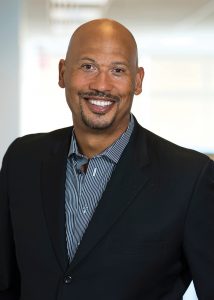Howard Wright is not a new face in the industry — he was VP of global business development for Intel Sports and, prior to that, at Qualcomm — but he does have a new role: CEO, C360 Technologies, the Pittsburgh-based company whose technology has been used for such events as the Super Bowl, ESPN’s MNF, and major college football games. At both Qualcomm and Intel Sports, he honed his skills as a technology evangelist and also had a chance to develop relationships with some of the world’s top CTOs, league commissioners, and broadcasters.

C360’s Howard Wright: “We’re going up the stack and becoming an immersive-media–creation engine for the most valuable partners and teams and leagues in the world.”
“That takes a very special set of skills, and I am lucky to have learned them,” he says. “Some of those skills have been instilled in me by some of the greatest minds in telecommunications or mentors or friends to this day.”
Wright likes to refer to himself as a wannabe engineer going all the way back to his days at Stanford University, where he graduated with a bachelor’s degree in qualitative economics.
“I like to see how something goes from an idea on a whiteboard, into a patent pool, and then becomes something that permeates every part of our lives,” he says. “That fourth-dimension chess game has been what has kept me in high tech all these years.”
Evan Wimer, co-founder/CBO, C360, says that Wright’s skills will allow Wimer to focus on product development and other initiatives while Wright zeros in on relationships and strategy. He adds that Wright’s joining the company coincides with the closing of a round of financing with SeventySix Capital and that Wayne Kimmel, managing partner, SeventySix Capital, is now on the C360 board of directors.
“That gives us another weapon and insights at our disposal, which is tremendous and benefits our company,” Wimer adds.
He notes that innovation at C360 has always been about bringing a level of quality that fits into a production and, at the same time, brings a whole new set of opportunities to personalize the fan experience.
For C360, that innovation is a 10K camera system small enough to be mounted on a football yardage marker. Coupled with a wide-angle lens, it allows an operator to remotely pan, tilt, and zoom within the image, offering dynamic replays that can ensure a key moment isn’t missed.
That same system can also be tied into a live OTT or VR experience to allow the viewer to do their own pan, scan, and zoom.
“With betting,” Wimer points out, “the ability to select a particular player and track them throughout the whole game is where the future of sports is going. We can leverage the linear and OTT experience at the same time, and we continue to do things like add more digital zoom. That and color matching are two things we are [focusing on].”
Wright says that the evolution of consumer technologies coupled with broadcast technologies is creating the ability for fans to be on the field of play or follow players the way Wimer mentions.
“We want to create an option value for the broadcasters, for social, linear, and digital, and that is the part where Evan and I spend most of our time,” Wright says. “C360 isn’t just a pylon-cam company. It’s not a VR company. It’s not an AR company. The idea is that we’re going up the stack and becoming an immersive-media–creation engine for the most valuable partners and teams and leagues in the world. That’s the unapologetic goal.
“What we have at C360,” he continues, “is a very simple weapon to be utilized by the broadcasters and, ultimately, by OTT players. And what we’re trying to do is increase the efficiency, increase the efficacy, increase the horsepower of our solution so that it can service this industry and the other industries that we service.”
To help get to those goals, Wright says, he follows the Servant Leadership principles.
“You need to take and close action items as much as you need to give them,” he says. “You need to be an active listener and not a dictator. And you need to be a trusted member of the team that is working alongside the rest of the team, regardless of status, regardless of equity, regardless of title. The goal is to harness and galvanize the collective IQ of our staff and investment community. That’s going to propel us as forward.”
Adds Wimer, “Howard is the kind of person that we really needed and have looked for to lead the company. There couldn’t be a better person paired for the next growth cycle of the company.”